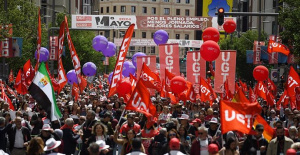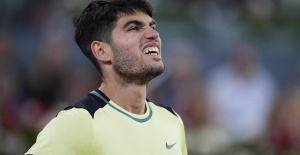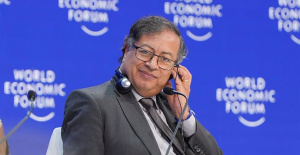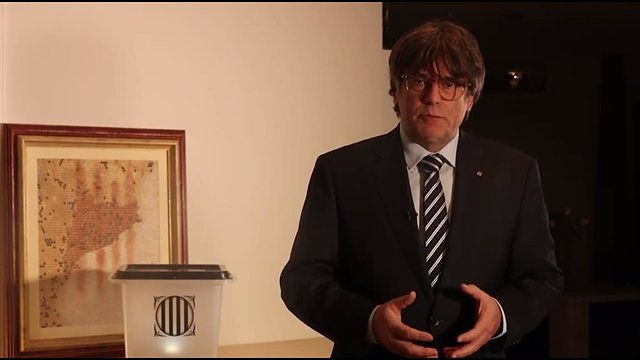Launches a battery of questions for a preliminary ruling for the CJEU in the event that the magistrate maintains the order
MADRID, 20 Ene. (EUROPA PRESS) -
The former Catalan president Carles Puigdemont has asked the instructor of the 'procés', Pablo Llarena, to annul the arrest warrant issued against him for alleged crimes of disobedience and embezzlement, while accusing him of "ignoring" the approved penal reform by the Cortes that entered into force on January 12.
In the brief, to which Europa Press has had access, the defense - in charge of the lawyer Gonzalo Boye - claims that, in the event that his appeal is not upheld, it be sent to the Court of Justice of the European Union (CJEU) a battery of preliminary questions. Among others, he urges you to ask yourself if the Supreme Court (TS) is the competent body to bring a case against a MEP, as is the case of Puigdemont, who enjoys immunity as a member of the European Parliament.
The independence leader thus responds to Llarena, who was forced to reformulate the prosecution and the search and capture orders against Puigdemont and the other fugitives from 1-O to adjust to the penal reform. The magistrate changed the disappeared sedition for disobedience, ruling out that the facts fit into the new crime of aggravated public disorder, and maintained the aggravated embezzlement, discarding the new attenuated versions.
In his appeal, Puigdemont denounces that he is the victim of an 'ad hoc' procedure motivated by the "fumus persecutionis" (persecutory spirit) that blames Llarena. His defense maintains that he "had neither committed a crime of sedition nor has he committed one of embezzlement."
In his opinion, although he points out that the penal reform that eliminates sedition and modifies embezzlement "could have had a greater democratic impact", "the problem is the facts, which do not fit into the penal system of any democratic state in our environment" .
On this point, he argues that in Germany a sentence was handed down that "implied the de facto repeal of the crime of sedition, like that of rebellion", even though the Legislator took "more than 4 years to make it effective and publish it in the Official Gazette of the Condition".
The defense concludes that "neither before the reform nor after it could and cannot be accused of the crime of sedition, much less of rebellion, or of public disorder of the surname that one wants to put on it because in no democratic system the acts of October 2017 are incardinable in any type of crime".
And he adds that "the same must happen with respect to the crime of embezzlement: the facts that are imputed to them are, at most, non-existent, as in the case of the phantom embezzlement of Unipost."
Regarding the new aggravated embezzlement, which is required by the profit motive, he argues that in the original indictment there was "no reference" to it, for which he accuses Llarena of carrying out a "mutation of facts and law" to "generate a criminal appearance that allows, if necessary, to be able to deprive the former president of liberty."
Puigdemont underlines the fact that Llarena cited the recent ruling on the 'ERE case' among the jurisprudence to express his surprise because, according to what he states, in it the Supreme Court said that embezzlement (before the penal reform) encompasses behaviors with "the spirit of profit" where the authority or official "incorporates (the flows) into his patrimony making them his own, or consents to another doing so".
He ties to this that "the extraction of public funds from 'public control' is required", emphasizing that this "is absolutely contrary to what happened in the present case" because there was "a thorough control of each one of the euros, and their corresponding cents", but "destined for purposes that the magistrate does not like".
Consequently, he reproaches Llarena for "going from configuring the alleged embezzlement as a means to commit a crime of sedition to contemplating embezzlement as an autonomous crime and aggravated to its maximum limit without the facts having changed."
Thus, he believes that the judge "only intends, if authorized by the CJEU, to issue European arrest and surrender warrants for the fourth time by checking, for the fourth time, the box corresponding to corruption", something that -he emphasizes- - so far "it has not served to confuse the enforcement authorities on any of the three previous occasions". "He won't get it on a fourth try either", he predicts.
In his appeal, Puigdemont once again combats the jurisdiction of the TS to prosecute him criminally, recalling that he is a member of the European Parliament and that "no legal precept provides that the members of the European Parliament must be judged before the Supreme Court or before any other jurisdictional body".
On the sidelines, the former president alludes to the jurisprudence of the TS itself, according to which "the recognition of special jurisdictions for the prosecution of certain people, to the extent that they represent an exception to the principle of the natural judge, cannot have an extensive interpretation".
Thus, he considers that Llarena "skips" the Supreme Court's own jurisprudence in order to prosecute him, "creating" an 'ad hoc' situation for the Catalan pro-independence MEPs. In addition, he recalls cases of other political leaders who, despite having an indictment, were released after being elected as representatives or senators.
On the other hand, he reproaches the instructor of the 'procés' for changing "the platform for the rostrum to criticize the Legislative power" and for dispensing with "any connection with the law of the Union." "We are facing a real situation of rebellion," he says regarding the magistrate.
And, with everything, urges Llarena to step aside and annul all the decisions adopted since Puigdemont was a member of the European Parliament, including the order by which he is prosecuted for disobedience and aggravated embezzlement, as well as to refer the case to an investigating court in Barcelona.
Lastly, it emphasizes that if Llarena does not withdraw or annul the order, he must submit preliminary questions to the CJUE regarding the competence of the Supreme Court. To do this, he quotes the president of the Criminal Chamber of the Supreme Court, Manuel Marchena, reproducing an epiphragm in which he stated that the question of the appraisals of MEPs is "a matter on which so many doubts converge."
Puigdemont indicates that, in any case, "he reserves the right, when the time is right", to take his case before the European Parliament itself, which "will have to rule on it" and "its decision will in turn, naturally, be reviewable by the competent body of the CJEU, with the consequences that this would have for the damaged credibility of Justice and of this procedure in particular".
The independence leader, prosecuted in absentia and on the run since 2017, alleges in turn that he has seen his fundamental right not to be punished twice for the same act violated. For the leader, there are two "parallel" procedures in the TS and in the Court of Accounts that "arise from the same facts" and "both sustaining in the field of repressing the Catalan independence movement."
"It is not in accordance with the 'non bis in idem' the existence of the two procedures nor in accordance with the principle of proportionality that the facts that give rise to a demand for accounting responsibility, by scope, also serve to demand criminal responsibility for a crime, embezzlement, and, furthermore, in its hyper-aggravated modality", he points out.
In line, he stresses that "in the unlikely event that the temptation to issue a fourth European arrest and surrender warrant persists, it will be the Justice of other member states that must assess how the 'non bis in idem' and the principle of of proportionality".

 Exploring Cardano: Inner Workings and Advantages of this Cryptocurrency
Exploring Cardano: Inner Workings and Advantages of this Cryptocurrency Seville.- Economy.- Innova.- STSA inaugurates its new painting and sealing hangar in San Pablo, for 18 million
Seville.- Economy.- Innova.- STSA inaugurates its new painting and sealing hangar in San Pablo, for 18 million Innova.- More than 300 volunteers join the Andalucía Compromiso Digital network in one month to facilitate access to ICT
Innova.- More than 300 volunteers join the Andalucía Compromiso Digital network in one month to facilitate access to ICT Innova.-AMP.- Ayesa acquires 51% of Sadiel, which will create new technological engineering products and expand markets
Innova.-AMP.- Ayesa acquires 51% of Sadiel, which will create new technological engineering products and expand markets COMUNICADO: Energy Transitions Commission (ETC) Urges Government and Industry Collaboration to Overcome Perceptions of Offshore Wind
COMUNICADO: Energy Transitions Commission (ETC) Urges Government and Industry Collaboration to Overcome Perceptions of Offshore Wind UGT and CCOO demand the regeneration of democracy, better salaries and a reduction in working hours
UGT and CCOO demand the regeneration of democracy, better salaries and a reduction in working hours Alcaraz gives up his reign in Madrid against Rublev
Alcaraz gives up his reign in Madrid against Rublev Petro announces that Colombia will break diplomatic relations with Israel
Petro announces that Colombia will break diplomatic relations with Israel How Blockchain in being used to shape the future
How Blockchain in being used to shape the future Not just BTC and ETH: Here Are Some More Interesting Coins Worth Focusing on
Not just BTC and ETH: Here Are Some More Interesting Coins Worth Focusing on Ivace and promotes a less invasive device for the early detection of prostate cancer
Ivace and promotes a less invasive device for the early detection of prostate cancer Valencia unanimously approves the ordinance to allocate spaces to test innovative initiatives
Valencia unanimously approves the ordinance to allocate spaces to test innovative initiatives UPV researchers promote a paid master's degree as a "talent factory" in integrated photonics
UPV researchers promote a paid master's degree as a "talent factory" in integrated photonics A spin-off of the UV works on obtaining high-resolution 3D biomedical images in real time
A spin-off of the UV works on obtaining high-resolution 3D biomedical images in real time A million people demonstrate in France against Macron's pension reform
A million people demonstrate in France against Macron's pension reform Russia launches several missiles against "critical infrastructure" in the city of Zaporizhia
Russia launches several missiles against "critical infrastructure" in the city of Zaporizhia A "procession" remembers the dead of the Calabria shipwreck as bodies continue to wash up on the shore
A "procession" remembers the dead of the Calabria shipwreck as bodies continue to wash up on the shore Prison sentences handed down for three prominent Hong Kong pro-democracy activists
Prison sentences handed down for three prominent Hong Kong pro-democracy activists ETH continues to leave trading platforms, Ethereum balance on exchanges lowest in 3 years
ETH continues to leave trading platforms, Ethereum balance on exchanges lowest in 3 years Investors invest $450 million in Consensys, Ethereum incubator now valued at $7 billion
Investors invest $450 million in Consensys, Ethereum incubator now valued at $7 billion Alchemy Integrates Ethereum L2 Product Starknet to Enhance Web3 Scalability at a Price 100x Lower Than L1 Fees
Alchemy Integrates Ethereum L2 Product Starknet to Enhance Web3 Scalability at a Price 100x Lower Than L1 Fees Mining Report: Bitcoin's Electricity Consumption Declines by 25% in Q1 2022
Mining Report: Bitcoin's Electricity Consumption Declines by 25% in Q1 2022 Oil-to-Bitcoin Mining Firm Crusoe Energy Systems Raised $505 Million
Oil-to-Bitcoin Mining Firm Crusoe Energy Systems Raised $505 Million Microbt reveals the latest Bitcoin mining rigs -- Machines produce up to 126 TH/s with custom 5nm chip design
Microbt reveals the latest Bitcoin mining rigs -- Machines produce up to 126 TH/s with custom 5nm chip design Bitcoin's Mining Difficulty Hits a Lifetime High, With More Than 90% of BTC Supply Issued
Bitcoin's Mining Difficulty Hits a Lifetime High, With More Than 90% of BTC Supply Issued The Biggest Movers are Near, EOS, and RUNE during Friday's Selloff
The Biggest Movers are Near, EOS, and RUNE during Friday's Selloff Global Markets Spooked by a Hawkish Fed and Covid, Stocks and Crypto Gain After Musk Buys Twitter
Global Markets Spooked by a Hawkish Fed and Covid, Stocks and Crypto Gain After Musk Buys Twitter Bitso to offset carbon emissions from the Trading Platform's ERC20, ETH, and BTC Transactions
Bitso to offset carbon emissions from the Trading Platform's ERC20, ETH, and BTC Transactions Draftkings Announces 2022 College Hoops NFT Selection for March Madness
Draftkings Announces 2022 College Hoops NFT Selection for March Madness























